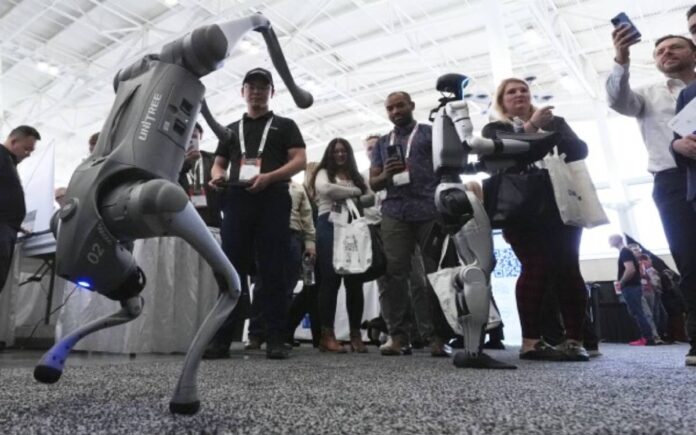Washington, D.C. – At this year’s Robotics Summit & Expo in Boston, thousands gathered to witness the future of humanoid and autonomous machines. Yet, behind the scenes of tech demos and keynote speeches, one issue dominated private conversations: U.S. tariffs on Chinese goods, and the growing uncertainty they’re injecting into the robotics supply chain.
While tariffs were not listed on the formal agenda, their impact was impossible to ignore.
“And I’m the CTO, so don’t ask me about tariffs”,joked Aaron Saunders, Chief Technology Officer at Boston Dynamics, drawing laughter from a packed audience during his keynote address. But out in the halls, concerns about trade restrictions were widespread.
“Tariffs are the No. 1 topic that we’re discussing in the hallways and at the water cooler”, said Steve Crowe, chair of the annual summit.
Robots Meet Realpolitik
The event featured advanced machines from around the globe, including the G1 humanoid robot from China’s Unitree. Retailing at $16,000, the G1’s price in the U.S. could jump to $40,000 if President Donald Trump’s 145% tariffs on Chinese imports remain in effect — a move that could stifle competition and innovation in the American market.
“It’s still a very narrow market, but I think there’s a huge potential on the industry side — for manufacturing, factories, and even home use”, said Tony Yang, Unitree’s VP of Business Development.
Yet Unitree’s slick humanoid, which waved at attendees and walked fluidly across the expo floor, is just the beginning of what’s possible. The question is whether the U.S. can keep pace, or if it will price itself out of the humanoid race due to geopolitical friction.
Supply Chains Under Pressure
Humanoid robots rely on a vast array of sensitive and globally-sourced components: sensors, semiconductors, batteries, rare earth magnets, motors, and more. Trade restrictions jeopardize that network.
Tesla CEO Elon Musk, who advises Trump, recently warned that China’s countermeasures on rare earth magnet exports could delay his company’s development of its Optimus humanoid robot.
Other companies echoed similar concerns.
“It’s added some inconveniences to our own supply chain. But it’s also opened up opportunities”, said Pras Velagapudi, CTO of Oregon-based Agility Robotics, whose Digit robot is already being deployed at a Schaeffler plant in the U.S.
“If tariffs lead to onshoring, local firms will face high labor costs — pushing automation further”, said Al Makke, Director of Engineering at Schaeffler, emphasizing that humanoids may be the solution to rising costs and labor shortages.
Robots vs. Trade Wars
For many U.S. robotics firms, navigating tariffs is becoming as crucial as innovating in AI and hardware.
“The supply chain gets very complex. We get parts from all over the world. Tariffs are adding a lot of uncertainty”, said Haitham Eletrabi, CEO of Tennibot, whose robot was seen serving balls on a full pickleball court set up at the expo.
Boston Dynamics showed off its advancements with Atlas, its humanoid prototype, though no physical unit was present. Still, the company’s famous Spot robot dogs roamed a designated enclosure, showcasing their agility and range.
Yet, the broader takeaway from the summit wasn’t just about what the robots could do — it was how global politics may shape what they’re allowed to do in the U.S.
Talent Migration at Risk
Beyond manufacturing challenges, political tensions are also affecting talent pipelines.
“In the past, people in Canada found it attractive to come and work for U.S. companies. Right now, they’re being very hesitant” ,said Francesca Torsiello, of recruitment firm Adapt Talent, adding that visa and trade instability are cooling interest among global engineers.
As America races to compete with China in humanoid robotics, its own economic policies may become a roadblock. While companies innovate on the show floor, backroom discussions suggest a rising fear: Is America slowing itself down?



